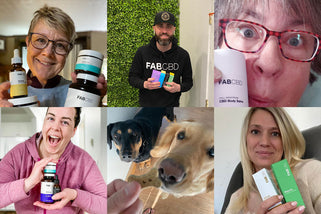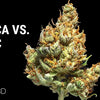There are a good number of states that are growing and cultivating hemp. And, as of February 2019, the amount of land that’s been earmarked for hemp production has swelled to over 31,000 acres. Even though hemp production is slated to grow over the coming years, Colorado has always been considered the leading state for hemp cultivation. Since the passing of the 2018 Farm Bill, it’s legal to sell and buy hemp-based CBD that contains 0.3% or less THC in the United States. Therefore, it’s no surprise that both CBD products as well as hemp cultivation have skyrocketed throughout the United States.
How Long has Hemp Farming Existed in the U.S.?
Hemp has been farmed for a multitude of reasons for hundreds of years. In fact, the English settlement of Jamestown in America grew hemp back in 1616 so sails, ropes, and clothing could be made. In the last century, laws restricting the use of cannabis went into effect across the country in large part because of the confusion between the hemp and marijuana plant. Up until 1970, hemp was only farmed commercially and used in food and textiles. But, the Controlled Substances Act grouped hemp in with marijuana, thus causing it to be labeled as an illegal Schedule I drug that also levied harsh regulations on the growing of industrial hemp.
Thanks to the 2014 Farm Bill, states and research institutions were allowed to create pilot programs for industrial hemp farming. Then, in December of 2018, the United States Congress passed the Farm Bill that took hemp and CBD extracts off of the Federal Controlled Substances List. For the most part, hemp-derived CBD is legal in almost all 50 states, however, there are still some states that are working on legalization. Because most states view hemp the same as any other agricultural product, the use of hemp-based CBD products has grown to epic proportions.
What Exactly is Hemp?

Just like marijuana, hemp is also a variety of the cannabis plant. More specifically, hemp is a strain of Cannabis Sativa. Even though both hemp and marijuana are cannabis plants, they both have very big differences in their overall makeup. For example, hemp naturally contains low levels of THC, or tetrahydrocannabinol, which is a cannabinoid that causes a euphoric “high” when taken in large amounts. The marijuana plant contains large levels of THC and will cause people to feel “high” when used. Because the levels of THC are so low in the hemp plant, hemp-based products will not cause anyone to feel any psychoactive effects. Interestingly, there are also some hemp plants that contain high levels of CBD, or cannabidiol, the other main cannabinoid in the hemp and marijuana plant. Many scientific studies have shown that in high amounts, CBD can counteract the psychoactive effects of THC. Hemp can be used for food, clothing fiber, biofuel, wellness and cosmetic products, and of course, as extracts in CBD products.
Why has Hemp Grown in Popularity?
Hemp is best known for being resilient and for having a long list of uses or applications associated with it. Therefore, farmers are seeing the plant as a high yield crop that can usher in a new source of revenue. Hemp plants also don’t need as much water or fertilizer as other crops like corn or wheat. It’s also an extremely sustainable plant, which is ultimately better for the environment in the long-run. In short, hemp is seen in the farming industry as an eco-friendly answer to many environmental issues around the world.
What Makes Colorado-Grown Hemp the Gold Standard?

Colorado is a landlocked state that features a climate that’s conducive to hemp growing. Some growers have even relocated to the state because of favorable growing conditions. Colorado’s climate is not too wet, so farmers don’t have to deal with mold or disease issues in their crops. The overall temperature is mostly dry and sunny. According to the Colorado Department of Agriculture, the number of licensed hemp growers in Colorado increased yearly between 2014 to 2019 from 250 to 2,812. However, that number dropped in 2020 because of the number of growers that flooded the market in 2019. Interestingly, even before the initial signing of the 2018 Farm Bill, Colorado has been head and shoulders above the rest of the states in the production and use of hemp. In fact, Colorado created its own legal framework for farmers to legally grow hemp in 2012. Because of this, the hemp industry was able to develop and grow. This also created an exciting market for a host of interesting products.
Colorado is also ahead of the game because it has a strict Seed Certification Program that was created by the Colorado Department of Agriculture. All seeds that are certified through this program are of top-quality. In order for the seeds to be certified, they must initially be approved by the state’s Variety Review Board that’s made up of key members of the Colorado Seed Growers Association. The seed standards are set forth by the Association of Official Seed Certifying Agencies, or AOSCA. Next both testing is conducted and genetics are reviewed to confirm that THC levels are at 0.3% or less. Finally, once approved, the seed packages are labeled “CBD Approved Certified Seed” before going off to hemp farmers. Thanks to this program, commercial farmers can be sure that they are growing a high quality product that hails from a state with strict standards and a sustainable market.
Because of Colorado’s dedication to high standards, one of the state’s farms became the first place in the United States to be granted organic status by the US Department of Agriculture. This was an extremely important happening within the hemp industry as a whole. Today, many hemp farmers and brands look to Colorado to grow, cultivate, and harvest their organic, non-GMO hemp from. Colorado has set the industry standard because of the groundbreaking and innovative work done by hemp farmers and various organizations within the state.
What Makes Colorado’s Climate Conducive to Hemp Growing?
Hemp farmers have carved their own space in certain regions of Colorado. In fact, the state has around five primary hemp-growing regions that also include four outdoor growing regions where farmers are able to have one crop cycle each year. Even though the state’s weather is great for hemp growing, it can be extreme at times. Colorado also experiences droughts, early snows and freezes, and golf ball-sized, baseball-sized, and even softball-sized hail that can potentially damage hemp crops.
The farmers who grow hemp in the state are able to protect themselves by being flexible in where they grow their crops. For example, some farmers who’ve grown water-demanding crops like soybean, corn, and other grains, have switched over to hemp, which requires a lot less water. Another great aspect about growing hemp in Colorado is that the state boasts low humidity. This works out great for farmers post-harvest, as they are able to leave the harvested hemp outside for four to five days before turning it and leaving it outside for another four to five days. After drying the hemp out, they’re able to bale it up without having to use expensive drying systems. Winter weather can also be a bonus for Colorado hemp farmers. Because some growers rely on mountain snowpack and reservoirs for irrigation water, farmers in various regions of the state possess water rights to successfully grow hemp, a crop that doesn’t have as much water demand as other crops.
Why Should You Choose FAB CBD?

There are many great reasons why you should try FAB CBD’s products. First, all of FAB CBD’s pure and potent CBD products are crafted from clean, non-GMO hemp that’s grown and harvested in Colorado. The hemp is free from pesticides, herbicides, heavy metals, fungicides, and other harmful chemicals. FAB CBD also uses the industry preferred CO2 extraction process to ensure that all of our extracts are free from dangerous solvents, chemicals, and other impurities. All products are then tested by an independent third-party lab to ensure that they are both pure and potent. Our customers can easily find and read all of these lab reports on the FAB CBD website. Because we care about what goes into our products and how they are made, what results are top-quality, potent products that are super clean and customer-preferred. In order to have high-quality products, we start by using top-shelf hemp that’s grown according to strict industry standards in the state of Colorado.
Colorado Sets the Standards

Hemp is a versatile product that’s part of an ever-growing industry. Since the jump in CBD’s popularity, hemp has been carefully cultivated to make high-quality CBD extracts that contain cannabinoids, terpenes, and phytonutrients that can greatly aid health and wellness. Indeed, Colorado set the industry standard and helped spark widespread production and scientific research of hemp and CBD within the United States. Today, many reputable brands, like FAB CBD, choose to use Colorado-grown hemp in the creation of their top-shelf CBD products. In researching various CBD brands and products, it’s pivotal to also look into where the brand sources its hemp. Rest assured, any brand that uses hemp from Colorado to craft its products cares about the quality of what it creates.







